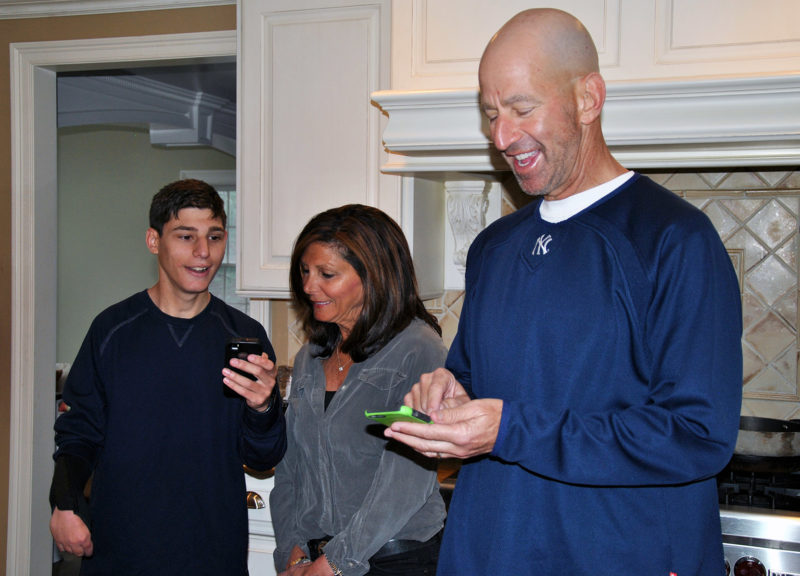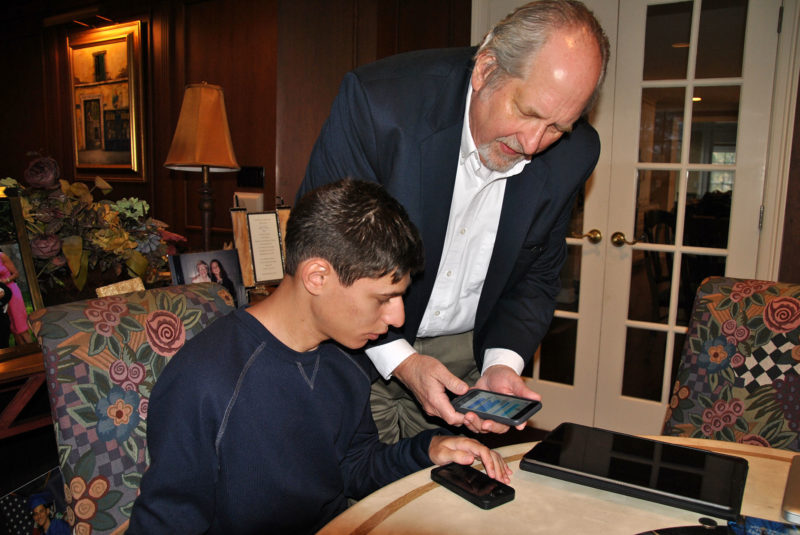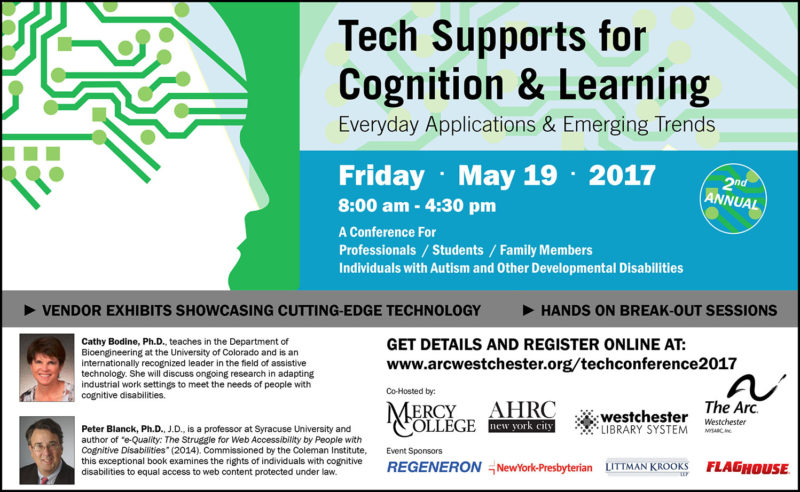For people without disabilities, technology can make things easier, but for people with cognitive disabilities, technology makes things possible.
“At some point, Max’s communication by text seemed so different from the past that I called my wife and asked her, ‘Are you coaching Max when he responds to my texts?’ He was responding with full sentences, when in the past it had been mostly ‘yes’ or ‘no’ answers to questions. That’s why I was surprised. But, in fact, my wife wasn’t coaching Max. It’s just that with expert training, he has gotten so much more comfortable with being able to text.”
– Bernard (Bernie) A. Krooks, Esq., parent

From left: Max, Robin and Bernie Krooks practice their texting
Bernie’s anecdote about his son Max is a simple but moving example of the power of personal technology in transforming everyday life in our community today. It may not sound like a “big deal,” but for a parent of a child with autism or other developmental disabilities, communication through technology is life changing.
We are living in an age when technology offers enormous possibilities for communication – something most of us already take for granted. However, we have only scratched the surface of how these technologies can support people with autism and other developmental disabilities as they work towards personal goals and living more independently in the community.
Unlike many older assistive technologies, the devices at the heart of new technologies – especially smart phones and tablets – are small, portable, and do not mark a person as being “different.” This is a huge plus in protecting the dignity of the people involved, and in meshing seamlessly with the society around them. This is especially true for young people, for whom peer interaction is so important.
The key in the effective use of personal technology is to first identify the need, establish the personal goal, and then develop tech solutions to help address both.
Max’s developmental disability limits the use of his right hand. His parents and his three siblings wanted to more easily stay in touch with Max and he wanted to master texting, so he could connect with his family and friends.
We began to work on the predictive text capabilities of his MacBook laptop and then used the keyboard and voice-to-text features of his iPhone’s messaging app to develop efficient ways to send texts to his family. Remarkably, the more Max texted, the more his reading skills improved and he began to initiate communications and respond with more than one or two word replies. Now, his father says text exchanges with Max after school are one of the highlights of his day.

Jordan and Max check out a new app on his smartphone
The Arc of Westchester is committed to applying these new personal and affordable technologies in creative ways to help people like Max reach their goals. It might mean using scheduling and task apps like CanPlan and First-Then-Visual-Schedule to help someone get ready for work in the morning or to remember the steps and timing of a job function. There are grocery buying apps, home chores apps, navigation apps, and so much more that can help remove barriers.
Because young people are the ones who are likely to adapt quickly and benefit most from new technologies, Arc of Westchester is creating a Technology Enhanced Simulated Studio (TESS) to open in Mount Kisco, NY this fall. This training site will provide a technology-rich home/work environment for young adults to help them learn to use technology and overcome challenges in their transition to adult life. TESS will also be offering in-person and online technology training for families so that they can further enhance their loved ones’ learning.
Since 2014, Arc of Westchester has developed alliances with other organizations to focus on the use of everyday technology to help support the functional needs of people with developmental disabilities. For example, the partnership with Mercy College has led to the two organizations co-hosting the second annual tech conference on May 19th in Dobbs Ferry, NY, “Tech Supports for Cognition and Learning: Everyday Applications & Emerging Trends.” Professionals, teachers, and family members, will enjoy a full day of workshops and presentations to learn about affordable personal technology solutions that can result in more functional independence and integration into the community. If you are interested in attending, please see our ad in this issue or visit arcwestchester.org/techconference2017.
To sample the extensive universe of personal technology, please visit The Arc’s Tech Toolbox™, an online database of personal technology options (https://toolbox.thearc.org). This is a free web-based tool that offers a simple drop-down menu system to match phone/tablet/computer technology to the needs of individuals. Arc of Westchester has served as a testing site for this resource, developed through the generous support of Comcast and Google.
In addition, Arc of Westchester has joined nineteen individuals from Arc chapters and other organizations in launching a monthly phone/web forum to share ideas, report successes, and create joint programs to gain funding for technology solutions. If you are interested in learning more, please email me at jjankus@arcwestchester.org.
Jordan Jankus is the father of an adult daughter with developmental disabilities and his interest in finding ways to empower her led to his involvement in assistive technology. He now helps support individuals at Arc of Westchester and other organizations with person-centered technology solutions.
In 2015, he became one of sixteen Technology Navigator Fellows selected by the national organization, The Arc. Jordan has presented on personal technology at state and national meetings of service providers, sharing insights and resources on helping people with I/DD use technology for personal empowerment.
Jordan holds a Master’s Degree in Public Health and a Graduate Certificate in Assistive Technology from New York Medical College.




